
Features | Lists
By The Staff
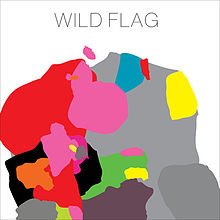
30 :: Wild Flag
Wild Flag
(Merge)
When it was initially announced in 2010 that Sleater-Kinney’s engine room would be joining forces with Helium guitarist Mary Timony on a new rock project, no one really questioned whether it would be any good; it would, in other words, take some mighty effort to fuck that one up. And yet even the most devout Carrie Brownstein-worshippers (hi, me) were surprised by the blistering self-assuredness of Wild Flag’s debut. It’s a kind of concept record where the only concept is how awesome it is to be in Wild Flag.
Remember how fantastic rock guitars sounded in the mid-‘90s? Buzzy, crunchy, every complex riff properly recorded to analog tape, absorbing the wonderful imperfections of the heat of the moment at which they were recorded—Wild Flag certainly do. While Brownstein was already accustomed to windmilling guitar heroism in Sleater-Kinney, it’s a kick to see this band onstage and realize that all of the knottiest lead parts actually come courtesy of Timony, forever an underrated guitar hero care of Helium, now forced to rock out in a live setting like never before. Rebecca Cole’s vintage keyboards provide a subtly psychedelic counterpoint, and—nixing the last three Quasi records from consideration—Janet Weiss’s drums bear zero tolerance for dreck. Her drums are the indie equivalent of the Good Housekeeping Seal of Approval.
But we’re all here for the riffage: whether the steam-rolling metallic stomp of “Black Tiles,” the Guy Piccioto-style lead and forward propulsion of “Future Crimes,” or the glorious fuzz-blues scales over Elton John piano rolls on signature seven-minute romp “Racehorse” (as in “You put your money on me”). Wild Flag suggests the Patti Smith Group with multiple Lenny Kayes, or a less shriek-y version of Sleater-Kinney, but no preaching, more utter abandon; yet it simply can be just a loud, unpretentious rock and roll record from re-vitalized veterans realizing their job is the best job on earth. That their job is a calling. That Wild Flag is exactly what they were put on this earth to do.
David M. Goldstein
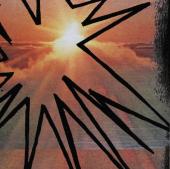
29 :: Roommate
Guilty Rainbow
(Antephonic)
Once, I accidentally (read: drunkenly and having an awesome idea of baking some macaroni and cheese) managed to grate my thumb-knuckle off on a cheese-grater. And through the funny curl of skin, the little schmutz of viscera, saw all too clearly (before passing out): a taut and curiously white string that was—grit those teeth, folks—my tendon. It is a similar sinew, the voice of Roommate’s lead vocalist and songwriter Kent Lambert, that bands the songs on Guilty Rainbow together. Mesmerizingly strong when it flexes, it wraps around and anchors these gaseous space-pop soundscapes, even as they expand and amorphously wiggle around under Lambert more than the room in that Jamiroquai video. And like that gross, skinny white yarn, like Lambert’s trembling wail, like all of Guilty Rainbow, there is a tremendous amount of power hidden so deftly within such unassuming space.
Guilty Rainbow is probably about a lot of things: war, being against war, Middle America, being Middle American, the futility of being a Middle American, and assorted other causes. But mostly, Guilty Rainbow seems to be about having a cause, about living with that cause, or causes, every day despite nothing much changing for the cause’s sake. Having a cause, after all, endless causes even, to wield with such a distinctively muscular voice can be a lot to ask from whomever’s listening and whatever music is expected to support it. It’s a monumental accomplishment that Roommate wholeheartedly, and not effortlessly, craft songs that never seem too easy but never dump that weight on our backs.
Often, a person’s beliefs are directly proportional to their need to believe, and Roommate’s songs are no exception. It’s in the careful revelation of their mutual dependence—of the beliefs to fulfill the need, and the needs to reflect the power of belief—that make Guilty Rainbow’s songs so easy to absorb. A seemingly bottomless grab-bag of causes (political, religious) Lambert holds side by side with all the frosted-over moments that hollow out the album’s space, and in their coexistence the causes gain weight, practicality; they sober up. Lambert’s presence throughout Guilty Rainbow is a squall of coming to terms with his stubbornness to relent, with his pettiness, and all the frequent grappling with loneliness that accompanies such idealism.
His sincerity lulls us into his world, and he litters his personal explorations with cues we’re all comfortable hearing, whether those take the form of lyrical references or the R&B sounds and space-pop staples which he uses to fill out his sound. From synths, vibraphones, the lounge-like tisks of a cymbal, the expanding chimes of “August Song,” to a percussive beat that seems concocted from the sticky suction of a shoe lifting off a theater’s floor—none of it fails to resonate. It’s a complicated but easy relationship Roommate forms: even that robot-heartbeat percussion seems to have warm blood pumping through it.
Kaylen Hann

28 :: Julianna Barwick
The Magic Place
(Asthmatic Kitty)
Is it enough to say sometimes that an album sounds beautiful? Not just beautiful, but sublimely, achingly, ineffably beautiful. Too beautiful for words, maybe, if you’ll permit the cliché. I guess that’s a bit of a critical cop-out, but it’s hard to put the appeal of The Magic Place into words without resorting to an incoherent babble of meaningless signifiers—it’s “ethereal,” you’ll read, and of course also “spiritual,” “evocative,” “transcendent.” It’s all about Julianna Barwick’s voice and how its layers swirl together, a collage of sound, enveloping you totally. It’s about imprecision, abstraction, its fundamentally sketch-like feel. And it’s about new age music, or maybe it’s about post-new age music, or indie-new age, or Enya. Probably it’s about Enya. You’ve read all of these things. They don’t really make sense, but then you listen to The Magic Place and you feel its spiritual/evocative/transcendent beauty, and then it all makes sense. It’s one of those records: it’s an album for which the language of criticism seems ill-equipped to describe its virtues.
Across her first two releases, Sanguine (2007) and its sister EP Florine (2009), Barwick showed promise. But I don’t think anybody anticipated an album as fully realized as The Magic Place to be the Louisiana-born, Brooklyn-based singer’s next project. More an evolution than a simple advancement of style, The Magic Place is in many ways the perfection of a form dabbled in by lesser artists for more than a decade now, and it’s the closest thing new age has had to an essential album since…God, Luxa (1996), I guess? And that’s assuming you even accept this as a new age record proper, which many don’t. Much in the same way that discussions about a new age canon inevitably devolve into a discussion about what does and does not qualify to begin with (where albums perceived to be cool simply adopt an “ambient” tag), discussions about The Magic Place often revolve around that label.
Is it a disservice to the album to frame it that way? Only if you get hung up on associations of that kind, and I doubt Barwick does. And I don’t think it matters much either way: the record operates way beyond stuff like that, all the useless words dragged into its orbit. It’s Barwick’s voice as abstraction, seemingly heaven-sent, sort of Malick-like in the way that it’s both sweepingly universal and intensely, intimately personal. It’s also dense, well-layered and finely detailed—ideal for attentive listening even though it seems best-suited, at first glance, for a cursory read-through. (It’s pretty aural wallpaper, you’ll think, until you get up real close to it and notice how meticulous its patterns have been etched in, and then realize that it’s actually more like a mural, well-worth scrutinizing.) But then here I am fumbling around with the metaphors, trying to pin the essence of this thing down and not getting remotely close. I don’t think it can be done. The Magic Place defies these paragraphs. It’s too beautiful to blurb.
Calum Marsh
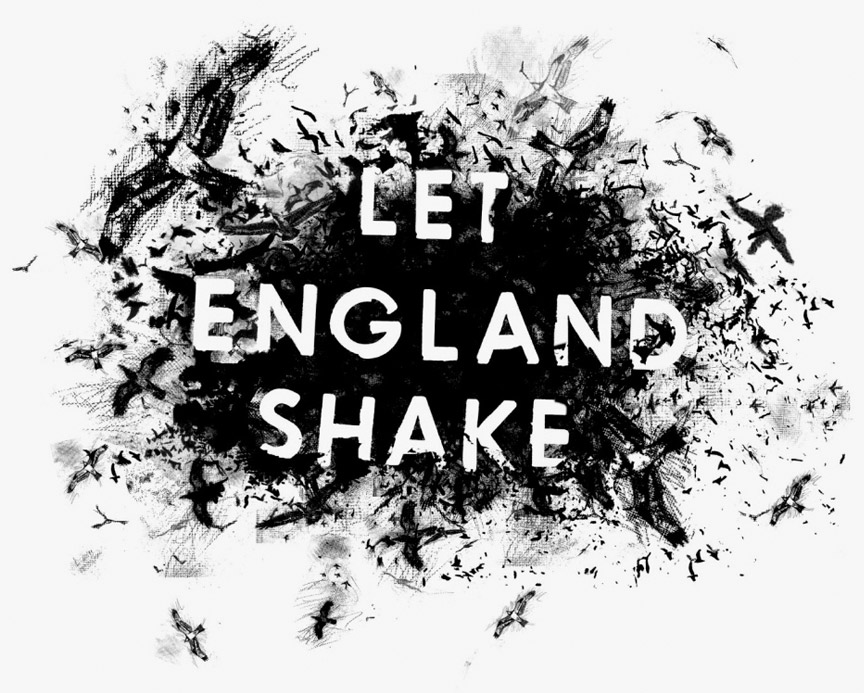
27 :: PJ Harvey
Let England Shake
(Vagrant/Island)
Let England Shake is not just about a past but a legacy. The past is a photograph or an empty casing; a legacy is orphaned children, post-traumatic stress, a stain. The past can be left alone or embraced, but a legacy tracks you down when you least expect it, refracting your own present actions through the lens of former glories and defeats. Here, PJ Harvey examines the legacy of England, turning the word over and over again as if it were a beautiful but lost idea, broken by an impression left on the world from the bloodbaths of World War I to the pathetic posturing of the Blair administration.
The greatest conceptual accomplishment of Let England Shake may be that it seems to collapse these events into each other. When the modern nightmare of Iraq finally rears its head on “Written on the Forehead” (a “sad circus by a trench of burning oil,” that unique way some intrepid Brits have of bluntly trampling over every other Western country’s neutered journalistic clichés) it’s through a fog of other 20th century disasters, as if we might imagine a time when we can recognize our current conflicts as equally wrong-headed.
The music itself collapses eras and regions in the same way, creating jarring but poignant juxtapositions that resonate with the uncanny re-contextualizations of a Brecht opera. The confident, shimmering chords of “The Glorious Land” are disturbed by a military fanfare (echoing Pearls Before Swine’s use of the bugle call from the Charge of the Light Brigade in their introduction to Balaklava (1968), another album that draws on a century-old conflict to protest contemporary warfare), the call to order inverted into dissonance like the dementia of an aging vet. Immediately following a song dedicated to Gallipoli, “England”’s bitter reverie is haunted by Bulgarian choral lamentations, as if the shadows of the Ottoman Empire refused to retreat, threatening (or is it forecasting?) Britain’s own collapse.
Some of these decision seem initially baffling: the use of a tossed-off line from “Summertime Blues” (“What if I take my problem to the United Nations?”) on “The Words that Maketh Murder” is absurd, but that’s precisely the point, transforming sexual frustration into the limitations of individual political action. The aforementioned “Written on the Forehead” cushions its apocalyptic setting with a dancehall-inflected voice singing “Blood, blood, blood, blood and fire, fire,” applying a genre that glorifies violence to a situation where its bravado seems crass and alienating. Both tracks apply almost playful gender politics and pop music tropes to the gravest topic known to humanity in a way I would call punk, were they not implemented so subtly. Maybe it’s that superficially accessible quality (Flood being one of the co-producers) that caused Sasha Frere-Jones in The New Yorker to criticize her for no longer “singing from the gut”—as if these songs were too cerebral or not impassioned enough—but it’s this very quality that makes Let England Shake both Harvey’s most subversive album and also a logical arc of a career from narcissism and unbridled id to a more thought-provoking, all-encompassing exploration of basic ideas about life, death, and suffering.
In the middle of it all stands perhaps one of the greatest anti-war songs ever written. “On Battleship Hill” revisits the famous battle at Gallipoli, one in which “cruel nature” proves to be the sole winner, Harvey’s voice piercing the air in her highest register as if the imagery was so potent she could hardly get it out. The scent of thyme is her madeleine here, a brilliant literary turn: thyme is the symbol of courage, but also historically the herb laid at coffins to aid in the passing to the next life. Her evocation seems to suggest the inevitable fate of even the most courageous warrior: the land returning to “how it has always been” is the only guarantee—even hope, perhaps—of war.
Joel Elliott

26 :: Oneohtrix Point Never
Replica
(Software)
With Replica, Daniel Lopatin—at last—has released an album that sounds like the hazy radio stations of his memory. He’s come close before, but these ten tracks show off his blurred ambient formula to dazzling effect; at times it feels like we’re in the Large Hadron Collider picking up interference from the ’90s. At times it’s a mess: the vocal exercises of “Nassau,” like Brian Eno on cheese, or “Sleep Dealer”‘s muddling of the Quantum Leap sound effects palette. There are twists and glitches galore to convince you your sensory perception dials have been hijacked; this is not the kind of ambient music to take into the tanning salon—you’ll come out twitchy, with bits of you more bronzed than others.
But it’s those little hiccups that give the record its edge, and makes it so deviously subconscious—don’t be alarmed if flashbacks occur while out choosing groceries hours later. Lopatin’s breathy drone and sun-bleached synths are warm enough to seduce anyone, with plenty space reggae/noises from the Ecco the Dolphin games to finally give Lopatin a sonic identity all his own. In short, Replica is precisely the kind of album that makes one memorize an artist named after a misspelled, imaginary radio frequency.
George Bass

25 :: Chad VanGaalen
Diaper Island
(Flemish Eye/Sub Pop)
The changes Chad VanGaalen has made to his sound on Diaper Island have been credited to his work on Women’s two albums, and specifically Public Strain (2010), but I think that ignores past releases in VanGaalen’s own catalog. Yes, Diaper Island is a departure, but the changes are mostly economic. The same pre-2008 VanGaalen aesthetic shines through, but his medium is stripped down, the instrumentation and enthusiasm kept at a depression-suppressed minimum. Consequently, Diaper Island is both his most straight-forward “rawk” record—streamlined instrumentation results in overexposed guitars and underperforming amps—but also his most morose.
As an artist VanGaalen was never particularly sunny, but Diaper Island manages to hover in the part of the brain where dread is manifested. It’s quite an accomplishment, with VanGaalen sliding along an axis between the personal and the existential like beads on a string, finding no happiness in the clouds or on terra firma. With both states of mind producing the same sordid mentality VanGaalen neglects their difference, forcing the cosmic and the terrestrial through the same despondent lens. For instance: his Camus-like indifference towards the corpses of his crew-mates (“Wandering Spirits”) soon fades into a fable about an unloved woman considering the correlation between her loneliness and her pubic hair (“Shave My Pussy”); the woman he is waiting up for in bed is “a golden beam breaking into the ocean deep” with the ability to “pull strange gifts from the hearts of trees” (“Sara”); he begs for someone to tap in as a Chad replacement while his companion considers the deistic possibilities of their existence (“Replace Me”); spirits gallop out of him and into his campfire but he can’t shake this recurring dream he’s having which has something to do with “interstellar space” being “broken in” (“Peace is on the Rise”).
These strange visions might sound nonsensical, especially divorced from these tremendous songs, but with them VanGaalen narrows in on his problem: he spends too much time in his head and his anxiety feeds upon itself to stay alive. It’s a feeling many can relate to, that in an indifferent, absurd universe it can seem that our place is to worry and stress. The album opens with Chad shouting to the audience “Do not fear!”, but trudging through a few takes of this it’s becomes clear that his suggestion is less a warning and more a mantra. He accepts the idea that “there is nothing to fear but fear itself” but can’t seem to exercise the willpower to avoid it. In this Diaper Island reveals itself not to be an actual place, for that would be something too easy for one to physically escape from. It exists more as a state of mind.
Brian Riewer
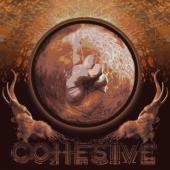
24 :: G-Side
The ONE... COHESIVE
(Slow Motion Soundz)
From its delightfully esoteric title to its sampling of Beach House on “How Far,” G-Side’s The ONE…COHESIVE is the sound of the Alabama rap duo recognizing exactly who’s feeling their music most and then figuring out how to go big with that. So they played Pitchfork Fest this year and then were featured in Spin. If it weren’t for the more recent and somewhat disappointing iSLAND with its aesthetic mis-steps and overreaching, I’d say that none of this has changed G-Side or what G-Side does well. Let’s hope that The ONE is the more telling document of what’s to come.
To be honest, production outfit Block Beattaz are as essential to G-Side as G-Side themselves and so it is the Beattaz’ great success on The ONE that makes it G-Side’s most successful tape yet. “How Far” is the feel-good hustle anthem of the year while tracks like “Y U Mad,” “Jones,” and “Nat Geo” elevate the “slow motion soundz” style of synth-wash hip-hop to new levels of dizzy bliss (and it’s Clams Casino’s beat but “Pictures” is a total gem). The record may not be quite as “COHESIVE” as it claims to be—“Never” is a particulary jarring tangent into garishness—but in terms of sequencing it at least does a good job of evenly dispersing the great tracks with the good ones for the entire course of the record; past G-Side releases, particularly Tha Hip (2009), would be solid for the first two-thirds and then blow your mind with the closing suite of songs (a form that iSLAND returns to but without the same overall standard of quality).
There’s a skit on here where the definition of “cohesive” is rather seriously recited, which is worth a groan or two, but at least it is indicative of the ambition that The ONE embodies. G-Side have always made down-to-earth, Southern rap for otherworldly, distinct beats; now they’re working on how to up the ante and really lay claim to their audience while maintaining their methods and philosophy. It’s rare for a rap group to be so intent on crafting their discography as a unified body of work and yet even iSLAND adheres to that approach. Here’s to G-Side keeping it ONE.
Chet Betz

23 :: Burial
Street Halo EP
(Hyperdub)
Burial is as addictive as loneliness, and CMG is hooked. Scouring the floor and every surface, swiping away Doritos and empty beer cans, in the hopes of finding even a measly crumb of impossibly fractured and re-constituted vocal samples and synths carved with a golden ice scraper. Our unhealthy obsession has cost friends—we may or may not have lost a staff member over a debate about whether or not his split 12” with Four Tet was eligible for our year-end list—and driven away the affections of lesser techno artists.
It wasn’t always that way. Untrue, released near the end of 2007, was un-reviewed and missed our year end list. Two years later, it had graduated to #13 on our Top 100 of the 2000s, its stature multiplying itself several times over. In the meantime, Will Bevan just kept grinding it out behind the scenes—or rather, he stood back and let his music grind it out for itself. A gradual realization began to dawn on myself, and I suspect a lot of other music critics as well, of how many similar but completely incomparable attempts have been made to capture that sound. Like a lot of other electronic pioneers of the last couple decades (Boards of Canada, Fennesz, Aphex Twin), there seems to be a strategy of releasing a labored gem then laying low for a few years to allow it to outlast all its imitators.
What of releases like Street Halo then, an impossibly-hyped EP with barely twenty minutes of new material? Are we victims of a carefully-orchestrated marketing scheme of anonymity and a painfully drawn-out release schedule? Perhaps it’s telling that many of the staff members’ reactions were “Yeah, it’s great, but will he be able to sustain this sound for several more albums?”, as if a half-dozen tracks every presidential term presented any danger of him growing stale anytime in the next half-century.
Like the title suggests, Bevan’s music is something both raw and untouchable, written into the reflection of headlights on a shuttered convenience store or the bowed heads of pedestrians crossing an intersection in the rain. Even his two full-lengths seem ephemeral—and in some ways incomplete—so it’s hard to find fault even with the most seemingly slight efforts. Across the three tracks of Street Halo you’ll find some of his best transcendent appropriations of grimy garage beats (“Street Halo”), his most desolate use of static (“NYC”) and his most gorgeous three-note melody-shards (“Stolen Dog”) across his catalogue. If anything, the timing of Burial albums suggest Bevan understands the relationship between desire and loneliness better than anyone: it always feels best when you’re deprived of it long enough.
Joel Elliott
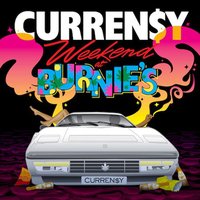
22 :: Curren$y
Weekend at Burnie's
(Warner Bros.)
Right: get high. The mission statement is ostensibly dumb, but then, why does Curren$y’s music radiate such joy? If there isn’t some grain of profundity in spending an irritatingly beautiful Saturday afternoon alternately feeding water and intoxicants to a hangover, playing Chrono Trigger, and bullshitting with whoever’s in earshot, then I’ve been scraping my fingernails across a barren Lay’s® bag for a solid half-decade. Spitta knows what I mean; he puts a hand on my shoulder and orders us some Chinese food. Leave it to one of rap’s most brilliant somnambulators to craft the populist record of the year. Of course, we (“the people”) already love him—dude yawns one masterpiece and three lesser works per year in between blunt hits, videogame sessions, and being conked out on the overstuffed leather couch he bought with money accrued from performing the verses in which he discusses said activities. Weekend at Burnie’s is even sleepier than last year’s Pilot Talk records; one imagines he set a microphone atop a TV tray to record this thing. But as Spitta recedes further into that couch cushion, his vision grows clearer (read: cloudier). When he implores the listener to “get paid / my nigga: get paid” on aptly-titled “Get Paid,” we wonder if we have the energy to make it to the ATM to withdraw the money we obviously deserve. Maybe we should twist something up and listen to “She Don’t Want a Man” a dozen more times. Surely, in the thrall of a late afternoon buzz engendered by salt, weed, and lightheadedness, this is the best song ever. Motherfucker, put your hands up…or don’t, whatever.
Colin McGowan

21 :: Robag Wruhme
Thora Vukk
(Pampa)
Recently, after several failed attempts at interpreting the words “Thora Vukk” in a range of online translator apps, I came to a very simple realization: there is no proper definition. Perhaps I should have expected as much; Robag Whurme’s first 2011 release, a beautiful DJ mix entitled Wuppdeckmischmampflow, is similarly impervious to interpretation, though it’s individuated, alliterative flow seems perfectly apt in light of the range of styles Wruhme consolidates therein. Thing is, Wruhme’s music needs little contextualization. I’ve spent over half the year listening to Thora Vukk with no clue as to its literal meaning—album or song titles—yet it’s suffused atmosphere and the painterly images it evokes are amongst the most vivid I’ve heard captured on a minimal techno record in years.
None of this is new for Wruhme, an ambient-leaning German producer with a hefty CV but only two full-lengths to his name, who, at his best—say, on Thora Vukk’s immaculate centerpiece “Tulpa Ovi,” one of the year’s most stop-dead transcendent tracks—sounds like the most gorgeous end result possible for the Kompakt aesthetic, a style he’s influenced and a label he’s recorded for in the past. And in a year when the faux-nostalgia movement may have (hopefully) reached its peak, Thora Vukk felt naturally stirring and uncommonly passionate, leaving itself wide-open to emotional explanation without leaning on unnecessary guideposts. Sure, some of the found-sound samples Wruhme laces throughout these tracks seem to point toward some half-remembered past, but they’re just as likely to unsettle with their intimacy as they are to warm by means of their subconscious familiarity.
Bypassing the clipped, anthemic vocal and synth displays of the year’s most prominent bass, footwork, and techno records, Wruhme instead builds impressions of an organic aural landscape via an expertly fashioned marriage of acoustic and synthetic instrumentation, surrendering extravagance to the gentle shudders and patient palpitations of his methodically unfurling rhythms. As the album alternates between long-form meditations and free-form segues, it outlines a uniquely picaresque travelogue through modern minimalism’s most transfixing extremes, aping the ambiance of Wolfgang Voigt’s Gas project one minute (“Tulpa Ovi”), only to coax humanity from the cold climates of Pantha du Prince the next (“Bommsen Böff”), all the while building a three dimensional structure from loose bric-brac in a manner reminiscent of the Books. I’m still not sure what “Thora Vukk” means—and within these aesthetic confines I can see both the future and the past of electronic music with equal clarity, leaving me evermore curious to its impetus—yet it’s one of the few records released this year that made me feel genuinely comfortable and secure in the present.





